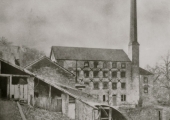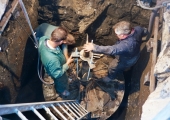.
Limpley Stoke Mill
Limpley Stoke, Bradford on Avon, Wiltshire
.

Limpley Stoke Mill, reduced in height and extended as offices
In the Domesday Survey of 1086 Bradford on Avon was listed as having two mills, of which one must have been in the town itself and the other would have been at Avoncliff or at Limpley Stoke. In those days the mill would have been small and employed in grinding corn for flour.
The mill at Limpley Stoke has had a chequered career since then. By 1376 it was being used in the woollen industry for fulling -cleaning and felting cloth by water-powered machinery. The mill was held, from the Abbess of Shaftesbury, by Adam Toukere, whose name indicates his profession as a tucker or fuller. In 1614 it was still in use as a fulling mill. Between 1796 and 1822 it was operated by the company of Bush, Newton & Bush, who had built a factory there which was employing 200 people in 1816. It was, however, vacant between 1826 and 1835 and again from 1842, when cloth manufacturers Saunders, Fanner & Co became bankrupt, until 1852.
In 1853 came the first of a series of fires and it was vacant again until 1866, when timber merchant Giles Holbrow bought it for £1,050 and converted it to a sawmill. He and his son William James (Willie) had equipped part of it as a rubber factory by 1871 and in 1885 it was let to E.G. Browne and James C. Margetson who, needing to expand, in 1890 moved to Melksham and founded the Avon Indiarubber Co. Ltd. In 1885 Giles Holbrow was described as timber merchant and india-rubber manufacturer when a stable on the site collapsed, unfortunately killing two men and six horses. The second great fire came in 1890 and the Holbrows rebuilt it. Another rubber company, under Albert Wallington (after whom the Freemasons’ Hall in Bradford is named) and William George Weston started up here in 1896, making rubber wheels, but they moved to Adderwell Mill in Frome, Somerset in 1902. The Burnett Motor Tyre & Rubber Company was occupying the rubber factory in 1916, but had moved to larger premises at Yerbury Mills in Trowbridge by 1919. It became a sawmill again, but was again gutted by fire in 1939 and was briefly used by the Peradin rubber company of Bath in 1943 (they bought and moved to the nearby Freshford Mill in 1945) before reverting to timber once more, but the Holbrows moved their timber yard to Rowden Lane in Bradford in the 1970s, on the site of the present Sainsbury’s supermarket.
It was modernised in the late 1990s and later extended and was used as the offices of Profund, a pensions software company and, since it moved away to larger premises, by a number of companies in smaller units. In 2022 plans were submitted to convert it into twelve residential units.








